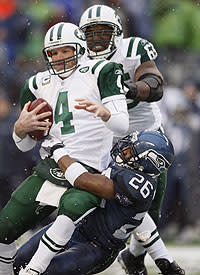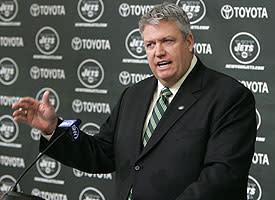Jets will pay for Favre experiment
Midway through last season, an AFC general manager made an interesting observation about the New York Jets rolling out the red carpet for Brett Favre. Spitting out some of the massive contracts the team had laid out in free agency, he noted that the spending bonanza reminded him of another franchise that had leveraged itself heavily around an aging quarterback: The Oakland Raiders and Rich Gannon.
His roundabout point: The Jets had gambled on salary-cap hell for one small window of a Super Bowl opportunity. At the time of the conversation, the GM suggested the Jets could be as much as $15 million-$20 million over the cap when the offseason arrived. And if the wager on Favre didn't end in a serious run at a championship, the Jets would be in significant trouble. Why? Because the entire gamble would hang on Favre's unpredictable and emotional nature at the end of a season. The free agent gluttony and willingness to put the team's future into the hands of Favre was the NFL version of the Battle of the Bulge – one desperate and risky head-on run, hoping to break through to a championship. If the risk failed, it would mean imminent disaster.

Favre and the Jets lost four of their final five games.
(John Froschauer/AP Photo)
Well, here the Jets are, coping with a veteran roster that has them pressed firmly against the salary cap, and with Favre's retirement, no franchise quarterback in sight. I can't help but think of the comparison to the Raiders, a team that was forced into a cycle of shedding overpriced veteran free agents after a Super Bowl run during the 2002 season, and then spun out of control when a neck injury in '04 forced Gannon's eventual retirement.
I think of the reported $140 million the team spent last offseason, particularly as it pertains to players like tackle Damien Woody, who turns 32 next season, and guard Alan Faneca (who turns 33) and fullback Tony Richardson (who turns 38). I think of a core that is made up of current or soon to be 30-somethings – Kris Jenkins, Thomas Jones, Laveranues Coles, Shaun Ellis and Bryan Thomas – and I realize that last season's one big push with Favre was likely it. And even more, that this team is closer to being blown up than it is to contending for a Super Bowl.
Consider the facts: Favre's retirement creates just enough room for the Jets to be flush with next season's salary cap. That means even if the team was totally and utterly inactive in the coming free agent market, it would still have to shed some salary in order to sign its draft class. And that might not be such a terrible reality, except for the slightly important fact the team … has … no … legitimate … quarterback.
This is a major reason why the Green Bay Packers cut Favre loose last season. They didn't want to be pressured by an NFL deity into salary-cap Russian roulette, while also simultaneously letting a potential successor to Favre languish and eventually escape via free agency. The Jets were willing to take that risk, and now they will pay for it.
So what's the future? The Jets still have plenty of talent on the roster. They are still a solid defensive team when Jenkins is healthy, and should become more formidable with the guidance of new coach Rex Ryan. Coles and Jones and other aging parts of the offense are on a slippery slope, but it's a unit that still should have some short-term juice, depending on Favre's replacement.

Ryan has some solid pieces on defense.
(Mike Derer/AP Photo)
What's clear now is that general manager Mike Tannenbaum had better have some tricks up his sleeve, because he was the one who wagered the roster's future on Favre. If he can't come up with a quarterback that can step in and maximize what's left of the prime of so many aging building blocks in the next two seasons, he's going to be following former coach Eric Mangini out the door. Assuming Tannenbaum and Ryan's new staff aren't enamored with Kellen Clemens (and word around the camp fire is that they are not), that means looking outward.
Luckily for the Jets, there are some healthy quarterback options available this offseason. Unfortunately, all the good ones will cost cap space the franchise doesn't have. Cross Patriots quarterback Matt Cassel off the list. The draft compensation needed to acquire him and the hefty contract extension he'll command would require a major and immediate round of salary slashing. And the Patriots aren't going to be interested in dealing Cassel to a team within the division, much less the hated Jets. Signing Arizona's Kurt Warner would also be cap prohibitive.
That leaves the Jets with four realistic options: trading for Cleveland's Derek Anderson or signing one of a trio of veteran free agents: Jeff Garcia, Byron Leftwich or the man who replaced Gannon in Oakland – Kerry Collins.
Bringing in Anderson and the remaining two years of his three-year, $24 million deal would mean some additional salary cap games, but that option seems unlikely since he doesn't appear to have exponentially more upside than Clemens. Collins will draw a competing offer from the Titans, so he won't be a rock-bottom bargain. That likely leaves Garcia and Leftwich as the most likely avenues allowing the Jets to seize on the veteran roster that is already in place.
So there is the ultimate price. The Jets took a shot and it resulted in a one-year Super Bowl window that never really opened in the first place. Now they'll spend the next few months scrambling to patch cracks in the foundation, likely hoping that Garcia or Leftwich or some other middling veteran on the rebound can save the ship.
